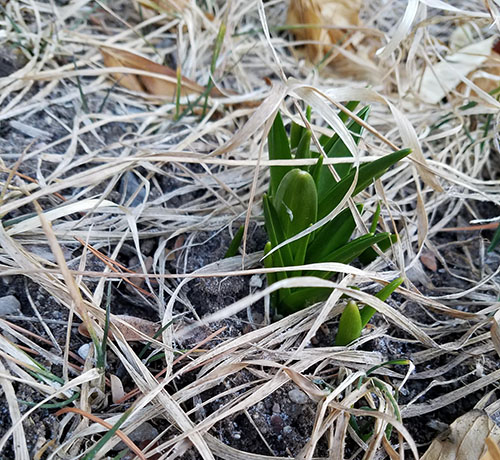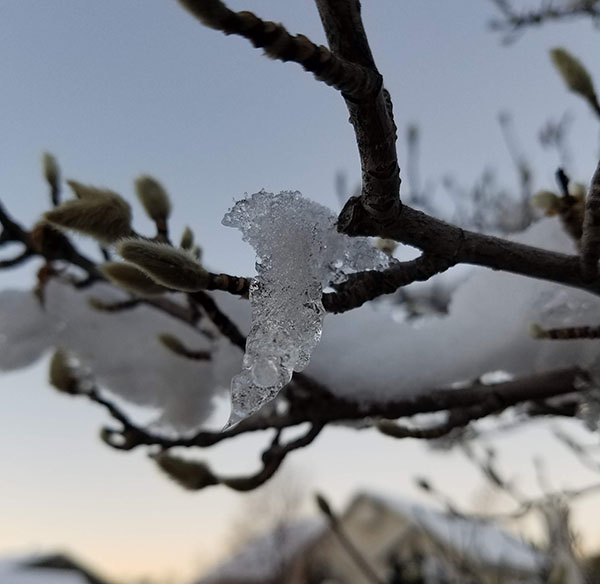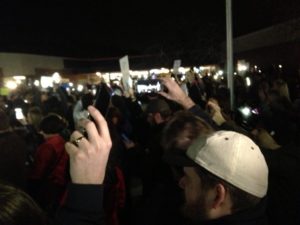I held the plastic horse in my hands, felt the solid weight of it. The touch of it’s smooth and shiny paint brought memory. The horse came to me as a gift from my Grandpa when I was ten or twelve years old. I don’t know if he knew about the collection of Breyer horses that I’d been spending all my money on for the prior few years. I just know that he saw the horse at some flea market or yard sale and thought of me. The horse had a missing leg and would not stand, so Grandpa solved the problem in his practical use-the-tools-you-have-on-hand way. He squirted silicone gel all over the leg, let it dry and then carved a vaguely-horse-leg-shaped leg out of the rubbery lump. My grandpa loved me enough to spend hours on a gift for me. That meant the world to me at the time he gave me the gift and in all the years since.
Holding the horse, I also remember that even while thanking Grandpa and hugging him, I knew that the horse did not fit in my collection. It was the wrong size. Its paint was shiny, not matte like the other horses. Most important to me, the horse had a static pose rather than the dynamic running, prancing, or rearing poses I found so lovely on the other models. It was not a horse I would have chosen for myself. Nor was the repaired leg how I would have chosen to make it. Even carved, the leg was lumpy, oversized, and pocked with the spaces where air bubbles had been trapped in the gel. It wobbled when I flicked it gently with a finger, sproinging like the doorstops found behind bedroom doors in my childhood home. So I carried this horse in my life that was simultaneously not something I wanted and also a representation of love so important to me that I clung to it.
I once saw the title to a novel that has stuck in my mind ever since: The Hidden Memory of Objects. It is a Mystery novel that I never took time to pick up or read, but the concept contained in the title stayed with me; the idea that objects have memories hidden within them. That is how I feel when I pick up a long untouched item like a book or a plastic horse. It is as if the memory was there inside the object and I access that memory by touching, smelling, or sometimes just looking at the object. “I’d forgotten about this” is a frequent thought when I am sorting through old things. The memory would have remained forgotten had I never seen the object again. The storing of memory in objects is the fundamental drive behind the purchase of souvenirs and the acquisition of memorabilia. When we are in a moment that we want to keep, we sometimes seek out an object to store it inside. Our effort does not always work, of course. Another frequent thought as I sort through old things is “where did I get this thing and why did I spend money on it?” Objects which are deliberately acquired with the intent of them being memorabilia are often poorly matched to the task.
I’ve had hours of opportunity to consider objects and their memories as I’ve been participating in the recent zeitgeist of clearing out clutter and minimizing possessions. It is as if people of my generation (and the one just older than mine) have shaken ourselves awake to look around and think “why on earth am I keeping all this stuff? It is just clutter that complicates my life.” Since I’m a willing participant of this Konmari/clutter reduction/minimalist effort, I obviously feel that the decluttering is a good process, but I also feel wary about taking it too far. I remember my Grandma’s last years and how she depended on familiar surroundings and familiar objects as anchors in her slipping mind. The memories in stored in the objects and photographs were far more stable than the fog and lights in her brain that sometimes showed clearly, but more often obscured, her ability to know who and where she was, or who we all were.
Forty-six year old me can look at a plastic horse and say “I do not need to keep this horse in order to remember that my Grandpa loved me.” and she will be right to say so. But what of eighty year old me? What will she need? Of course holding onto objects because we might need them later is the source of much of the clutter in the first place. It is exactly the behavior that the zeitgeist rails against, the desperate clinging to things in the belief that by holding things we can prevent future pain. Which is, of course, false. We have no way to control the future, not with objects, not with actions. All we can do is try to arrange our possessions and ourselves in a way most aligned with the people we want to be and the future we want to have.
I want to carry the memory of Grandpa’s love forward with me, but not a plastic horse that I never loved for itself. So I look around me for other objects which could hold that memory. Grandpa loved me my whole life until the day he died and probably after. That horse is far from the only thing he gave me. In fact, on the shelf next to the not-beloved horse, stands a beloved horse that was also repaired by my Grandpa at my request. The only difference is that one was a spontaneous gift of time and love vs the other being a requested gift of time and love. The beloved, repaired horse is as suitable a receptacle for the memory as the not-beloved one.
So much thought and so many words spent on a simple plastic horse. Most of the things I have let go did not require this much consideration. Not even close. I can feel the impatient observer in my brain huffing and saying “This is ridiculous, just take a picture of it and give it away.” I put the horse in the donation box with a pile of other less-than-beloved horses which are also destined to leave my life. They took up space in my life for thirty years because of the memory of me treasuring them. Now I am ready to honor the treasure of my twelve year old self by keeping only a few extra-special horses rather than keeping them all. With only nine horses, each horse carries a larger portion of memory than when there were thirty of them. I kept the nine whose names I remember.
The other twenty-one were so important to me once, and letting them go would feel easier if I could be certain that they would be treasured again by someone new. But that is me not wanting to fully relinquish. I have a lingering desire to control the fate of these objects. It is a trap. If I seek to control their disposition, then I am continuing to carry responsibility attached to them. If I give them to someone I know, I’ve retained the ability to ask after them, to fret over them. These are the strings that must be cut in order to do the emotional uncluttering work which is even more vital that the simple act of giving away stuff. I’m also ironically aware that in writing more than 1500 words about letting go of plastic horses, I am, in a way, keeping them. I transfer their memory from physical objects into digital words, far easier to store. Also easier to lose track of if I don’t take effort to curate and manage the storage of those words. If, on the other hand, I’m willing to treat words written as a live music performance which is expressed without expectation that it will be retained, then even in writing words, I am letting go.
I’m learning that I don’t have to keep all the things for fear of future need, and I don’t have to keep all the memories either. At forty-six years old I have over 24,177,600 minutes of memory. It would drive one mad to try to retain each of those minutes as a separate, always-accessible memory unit. Instead we have to consolidate, categorize, and blend. Brains are wired from birth to do exactly this. I lose memories all the time. It is a necessary conservation of mental resources, not a tragedy. When I pick up an object and am filled with memory, that same memory could likely be accessed in a different way with a different object, location, or smell. Even if that one plastic horse had vanished from my life years ago, I would not have forgotten that Grandpa loves me. In fact I am certain that I have forgotten hundreds of other events that were evidence of the same fact.
Objects come and go, memories come and go also, whether or not they are attached to objects. For right now I’m in a period of time where what I need is to clear away the accumulated detritus of who I used to be so that I have space enough to grow into who I want to become. This means bidding farewell to less-than-beloved objects and their associated memory clutter.
Edited 2/8/2019 to add: So after spending more than 1500 words talking about how it is okay, important even, to let things go, I kept the horse my Grandpa repaired for me. It stands in a solo space not with the rest of the collection, which feels better as it never really fit the collection. The deciding factor was my daughter poking through the box full of horses and asking to see the one Grandpa repaired. Then she mentioned that she’s always liked seeing the herd of horses on my shelves, a reminder that childhood is a thing to be proud of rather than shuffled away and forgotten. So now I have another series of thoughts on how objects can mean different things to different people and why, in a shared household, it is important to communicate about which things are important to us and why. Two boxes of horses got donated. I have my shelf of named horses. I have the one that Grandpa fixed. And I have about five more in an undecided box. They may be donated, they may go back on the shelves. I’m still thinking.
Edited 5/2/2019 to add: I also have a series of thoughts on how treasures become junk when they are separated from their stories. The grandpa horse currently has a story that makes me treasure it. If I share that story with my children, perhaps someday that horse will become a treasure to them as well. This is how heirlooms happen. But if I donate the horse, it is forever separated from the grandpa story. It just becomes a plastic horse with a wonky leg. The difference between treasure and junk is the story.



 I watched Jaws a couple of days ago. I haven’t seen it in years. There were moments when it really had me tense and other moments where I could see exactly how fake the mechanical shark looked. The scene that sticks in my mind is the one with all the people splashing and playing in the water while the music plays its ominous theme. The new year feels a bit like that to me. From this moment I have no way to know if I’m going to get a pair of kids with a shark fin that scared me for no reason, or if there will be blood and guts in the water. I don’t like feeling this way about the coming year.
I watched Jaws a couple of days ago. I haven’t seen it in years. There were moments when it really had me tense and other moments where I could see exactly how fake the mechanical shark looked. The scene that sticks in my mind is the one with all the people splashing and playing in the water while the music plays its ominous theme. The new year feels a bit like that to me. From this moment I have no way to know if I’m going to get a pair of kids with a shark fin that scared me for no reason, or if there will be blood and guts in the water. I don’t like feeling this way about the coming year.